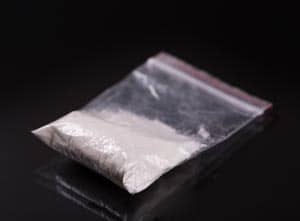Amphetamine (central nervous system stimulant)
One of the compositions for amphetamine is methylated phenylethylamine. The other drug, methamphetamine, is similar to amphetamine but contains more methylated phenylethylamine. Their chemical structure is very similar. Doctors prescribe amphetamines to treat attention deficit hyperactivity disorder, narcolepsy, and obesity.
In Canada, they are also prescribed to treat Parkinson’s. Both drugs cause the same side effects, dangers, potential for overdose and the same risk of physical dependence.
Description, Street Names & Effects
Brief Description:
Amphetamine is also referred to as Speed. Like cocaine, it’s a stimulant which increases a person’s ability to stay awake and even increases focus. It raises the levels of norepinephrine and dopamine in the brain, and when these chemicals increase, a person will feel euphoria and an increase in energy.
Street Names:
Speed, whiz, uppers, amph, billy, sulphate, grudge, dexys, blues, base, ups, wake-ups, bennies, dexies, black beauties, jollies, crazy medicine, yaba, and crazy horse.
Effects:
As mentioned, amphetamines are stimulant drugs, and their effects are very much like an adrenaline rush, with breathing and heart rate increasing. It is an appetite suppressant, and users feel energetic and confident, with the effects usually lasting for several hours. The body’s temperature increases, the pupils will become dilated, and there is an increased risk of dehydration.
More on Amphetamines
Amphetamines are human-made drugs with a bitter taste and usually come as white, greyish white, pale pink, or yellow powder, and sometimes as brightly coloured tablets. Amphetamines can be snorted, swallowed, injected, dissolved in a drink, or smoked. The substance has only limited medical applications because of its abuse and harm potential.

Pharmaceutical companies manufacture these for medical use, but they are also found in illegal clandestine labs for other purposes.
Amphetamines, also called amphetamine-type stimulants (ATS), were developed in the 1920s to treat depression and obesity, but stringent controls have greatly reduced medical use in Canada.
Side Effects
The powerful stimulant effects are similar to cocaine. They generally include rapid heartbeat and breathing at low doses. Increased blood pressure, sweating, dilated pupils, and dry mouth are other side effects of the drug. A person may become talkative, restless or excited, feel powerful, superior, aggressive or hostile, or behave bizarrely or repetitively.
Appearance and Use;
Amphetamine, like speed, is usually sold in baggies like cocaine. Pure amphetamine is white and odourless and has a bitter taste. Prescription amphetamines like Dexedrine are usually white pills.
After about half an hour if ingested but much quicker if injected or smoked (methamphetamine), the effects kick in after about half an hour and can last for up to six hours. But it all depends on the quality of the speed. A long, slow comedown follows the high.
Coming Down from the Drug
The comedown from amphetamines can be unpleasant and difficult.
These are some symptoms:
- sleep difficulties, extreme exhaustion
- headaches, muscle twitching and aches
- intense irritability, mood swings and depression
- paranoia, anxiety, hallucinations, confusion
- change in body temperature.
- difficulty concentrating
- feeling worthless or despair
Some people use other drugs like opioids, cannabis or alcohol to help them go through this stage. This practice is not safe and could create other dependencies. The comedown from just one use can take a couple of days, sometimes longer, affecting concentration and memory.
Mental Health & Amphetamines
People using amphetamines can develop mental health issues. Individuals using frequent high doses of the drug can experience a drug-induced psychosis. But in most cases, symptoms disappear after the person stops using amphetamines.
Withdrawal
Withdrawal can be challenging. The symptoms should calm down after a week or so and mostly disappear after a month. Symptoms include:
- cravings for the drug
- increased appetite
- confusion and irritability
- aches and pains
- exhaustion
- restless sleep, vivid dreams and nightmares
- anxiety, depression and paranoia.
Long-term use
With this drug, post-acute withdrawal syndrome or post-withdrawal syndrome (PAWS) can occur. Post-acute withdrawal syndrome is defined as experiencing the drug effects after a prolonged withdrawal period. Some symptoms can last up to a year in chronic amphetamine users.
This would include:
- Problems with short-term memory
- Impaired ability to focus, concentrate, or maintain attention
- Lack of self-control
- Depression with or without suicidal thoughts
- Inability to experience pleasure (anhedonia)
- Cravings
- Fatigue, sleep problems
- Weakened ability to deal with stress
Other Risks of Amphetamines
The body develops a tolerance to the regular use of amphetamines. Tolerance is the need for larger doses of the drug to achieve the same high, which can quickly lead to addiction. Some users can be tired and depressed for several days after using the drug. And high repeated doses can place a serious strain on the heart.
An overdose of amphetamines can be fatal, and mixing amphetamines with other drugs increases the danger significantly.
- Avoid taking speed and anti-depressants or alcohol. This combination can be fatal.
- Speed puts a strain on your heart. So, people with high blood pressure or a heart condition should not indulge.
- Taking a lot of speed can batter the immune system, so more colds, flu, and sore throats can occur.


